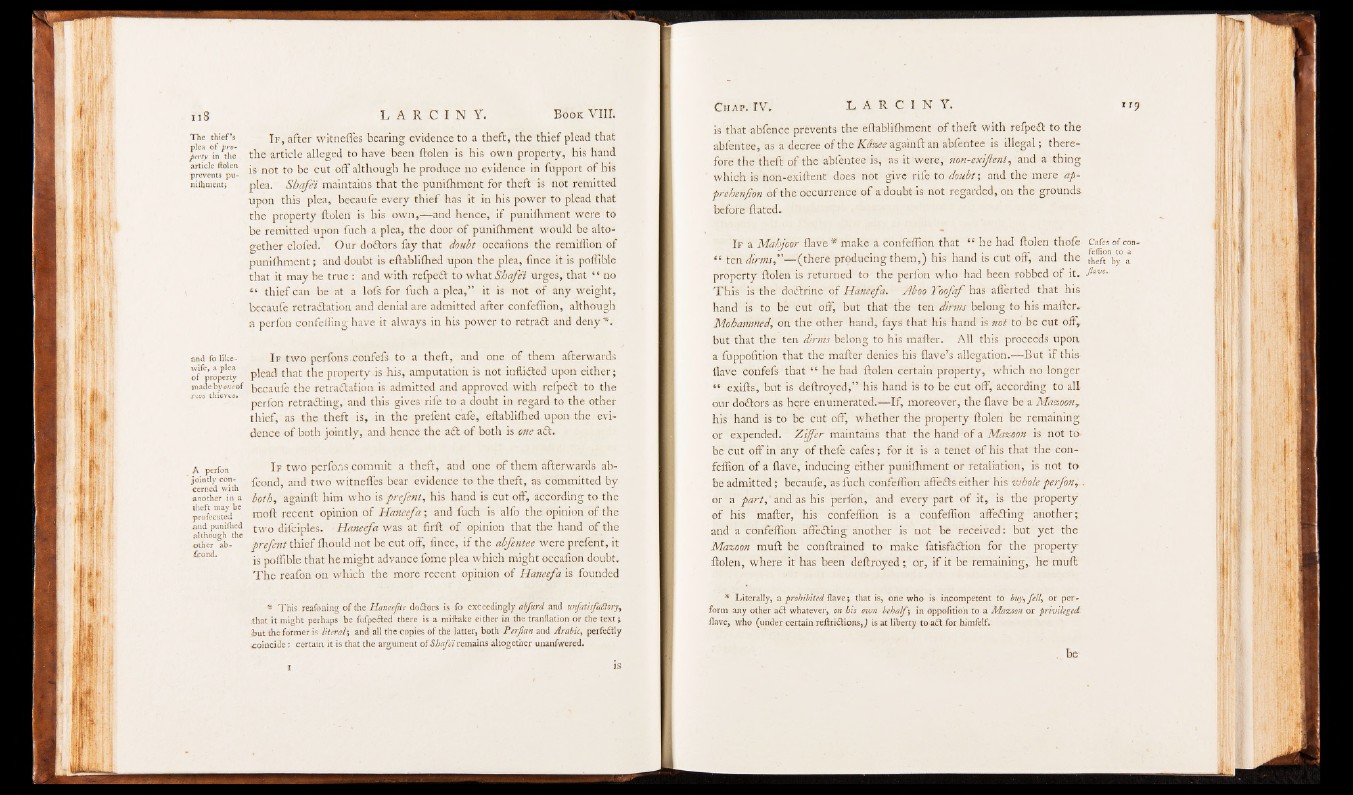
The thief’s
plea of property
in the
article ftolen
prevents pu-
niihmentj
and fo like-
wife, a plea
of property
made by one of
/wo thieves.
A perfon
jointly concerned
with
another in a
theft may be
profecuted
and punilhed
although the
other ab-
fcond.
If , after witnefles bearing evidence to a theft, the thief plead that
the article alleged to have been ftolen is his own property, his hand
is not to be cut off although he produce no evidence in fupport of his
plea. Shafe'i maintains that the punilhment for theft is not remitted
upon this plea, becaufe every thief has it in his power to plead that
the property ftolen is his own,— and hence, if punilhment were to
be remitted upon fuch a plea, the door of punilhment would be alto-*
gether clofed. Our dodtors fay that doubt occalions the remilfion of
punilhment; and doubt is eftablilhed upon the plea, lince it is poffible
that it may be true : and with refpedt to what Shafe'i urges, that “ no
H thief can be at a lofs for fuch a plea,” it is not of any weight,
becaufe retractation and denial are admitted after confeflion, although
a perfon confelfing have it always in his power to retradt and deny *.
I f two perfons -confefs to a theft, and one of them afterwards
plead that the property is his, amputation is not inflicted upon either;
becaufe the retractation is admitted and approved with refpeCt .to the
perfon retracting, and this gives rife to a doubt in regard to the other
thief, as the theft is, in the prefent cafe, eftablilhed upon the evidence
of both jointly, and hence the aCt of both is one aCt.
If two perfo.ls commit a theft, and ,one of them afterwards ab-
fcond, and two witnefles bear evidence to the theft, as committed by
both, againft him who is prefent, his hand is cut off) according to the
moft recent opinion of Haneefa; and fuch is alfo the opinion of the
two difciples. Haneefa was at firft of opinion that the hand of the
prefent thief Ihould not be cut off, lince, if the abfentee were prefent, it
is poffible that he might advance fome plea which might occalion doubt.
The reafon on which the more recent opinion of Haneefa is founded
* T h is reafoning o f the Haneefite dodtors is fo exceedingly abfurcl and unfatifactory,
.that it might perhaps be fufpefted there is a miftake either in the franflation or the te x t ;
bu t the former is literal-, and all the copies o f the latter, both P irfia n and Arabic, perfectly
co in c id e : certain it is that the argument o f Shafe'i remains altogether unanfwered.
is that abfence prevents the eftablilhment of theft with refpedt: to the
abfentee, as a decree of the Kdzee againft an abfentee is illegal; therefore
the theft of the abfentee is, as it were, non-exifient, and a thing
which is non-exiftent does not give rife to doubt-, and the mere ap-
prehenjion of the occurrence of a doubt is not regarded, on the grounds
before ftated.
I f a Mahjoor Have * make a confeflion that “ he had ftolen thole Cafes o f con-
“ ten dirms,"— (there producing them,) his hand is cut off, and the by 1
property ftolen is returned to the perfon who had been robbed of it. fa™-
This is the doctrine of Haneefa. Aboo Yoofaf has afl'erted that his
hand is to be cut off, but that the ten dirms- belong to his mafter.
Mohammed, On the other hand, fays that his hand is not to be cut off,
but that the ten dirms belong to his mafter. All this proceeds upon,
a fuppofition that the mafter denies his Have's allegation.— But if this-
Have confefs that “ he had ftolen certain property, which no longer
“ exifts, but is deftroyed,” his hand is to be cut off, according to all
our dodtors as here enumerated.— If, moreover, the Have be a Mazoon,.
his hand is to be cut off, whether the property ftolen be remaining
or expended. Ziffer maintains that the hand of a Mazoon is not to-
be cut off in any of thefe cafes; for it is a tenet of his that the confeflion
of a Have, inducing either punilhment or retaliation, is not to
be admitted; becaufe, as fuch confeflion affedls either his whole perfon,..
or a part,' and as his perfon, and every part of it, is the property
of his mafter, his confeflion is a confeflion affedling another;
and a confeflion affedling another is not be received: but. yet the
Mazoon muft be conftrained to make fatisfadlion for the property
ftolen, where it has been deftroyed;. or, if it be remaining,, he muft
* Literally, a prohibited Have', that is, one who is incompetent to buy, fell\ or perform
any other a i l whatever,, on his own behalf j in Cppofition to a Mazoon or p rivileged
Have, who (under certain reftridtions J is at liberty to adt for himfelf.
be